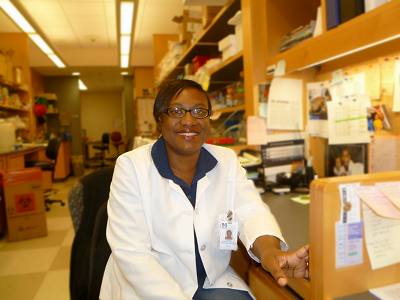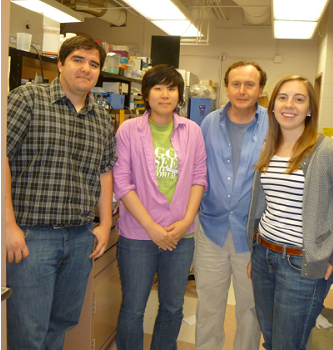| Among those who received degrees at UMass Medical School’s 39th Commencement exercises this past June were six individuals—nearly 5 percent of this year’s medical and biomedical sciences graduates—who had studied here years before they entered the doctoral programs. While still in college or high school, they participated in one or more UMMS summer outreach program for students from backgrounds that are underrepresented in medicine, or who are economically or educationally disadvantaged. The Office of Outreach Programs again hosted three diverse groups of young people this summer, all of whom shared the common goal of learning more about what it takes to become a physician, research scientist or other health care or biomedical science professional. This is the third in a three-part series highlighting the experiences of some of the students and educators who participated this summer in these potentially life-changing programs. |
 Amalene Cooper-Morgan, PhD |
More than a decade ago, Amalene Cooper-Morgan, PhD, had what proved to be a pivotal experience in the UMMS Summer Undergraduate Research Fellowship (SURF) Program. “It was life-changing and determined my future path,” said Dr. Cooper-Morgan, then majoring in biology at Long Island University with her sights set on medical school. “I held my first pipette, read journal articles, attended scholarly meetings and felt I might have a talent for research.”
Instead of heading to medical school, Cooper-Morgan went on to earn her PhD at Columbia University and is now conducting translational cancer research as a post-doctoral fellow in the laboratory of Brian Lewis, PhD, associate professor of molecular medicine, at UMass Medical School’s Graduate School of Biomedical Sciences. Cooper-Morgan has also come full circle with SURF, volunteering as one of three group leaders for the annual 10-week program. “The program has evolved since then, but what hasn’t changed is the faculty’s commitment to students.”
Co-founded and co-directed by Deborah Harmon Hines, PhD, professor of cell biology and vice provost for school services, and Janet Stein, PhD, professor of cell biology, SURF is designed to diversify the pool of biomedical researchers by providing structured, hands-on laboratory research experiences to undergraduate students, especially those from backgrounds under-represented in the field, or who are economically or educationally disadvantaged. Run by the Office of Outreach Programs and funded by the National Institutes of Health (NIH) and the UMMS Office of Research, the program this summer welcomed 32 juniors and seniors from universities and colleges across the country, some of whom had never worked in a laboratory before.
 Jeffrey Nickerson, PhD (second from right), hosted Summer Undergraduate Research Program students Nikki Rossetti (far right) and Dan Pak, with much assistance from post-doctoral fellow Alexandre Quaresma, PhD (left). |
Jeffrey Nickerson, PhD, associate professor of cell biology, and Jack Leonard, PhD, professor of microbiology & physiological systems, are, like Cooper-Morgan and the other group leaders and distinguished faculty who give their time to SURF, committed to inspiring potential future biomedical scientists. Dr. Nickerson hosted two fellows in his laboratory this summer. “I was an undergraduate psychology major when a biochemistry professor offered me a job, and now I do science,” he said. “I think that’s an opportunity that lots and lots of students should have. Bringing talented students into science is something we should all do.”
One of Nickerson’s mentees and Cooper-Morgan’s group members this year was neuroscience major and education studies minor Nikki Rossetti, a rising senior at Wellesley College, who took first place for best poster presentation at the SURF closing ceremonies. “It was exciting to be using microscopy in a new way and actually generating results,” Rossetti said of her project, conducted with the state-of-the-art three-dimensional microscope that supports the work of a major UMMS program project grant from the National Institute of Cancer.
“After spending several full days in a cold, dark room taking pictures of cells, I didn’t know if they were good pictures and if I was actually generating any data, but when we come back up here and we processed the files and plugged them in, all of a sudden we could tell something about the biology of the cell,” said Rossetti. “It was an ‘aha’ moment.”
“Nikki’s not just taking pictures, she’s doing a very sophisticated microscopy technique called fluorescence recovery after photobleaching that requires a lot of quantitative analysis and computations,” added Nickerson, who directs the Medical School’s Three-Dimensional Confocal Microscopy core laboratory.
“What I do is share the joy that I experience in the lab,” said Dr. Leonard, a founding faculty member who has been mentoring undergraduates since SURF’s inception. “It’s a steep learning curve, so I give students a manageable but real project.” This summer, in addition to SURF member Marcus Allen, Leonard hosted in his lab a high school intern, a medical student and a MD/PhD student, and also gave Summer Enrichment Program participant Kelly Carreiro the opportunity to continue her summer at UMMS as a volunteer.“Students learn that success in science requires persistence and vigilance. You have to be an optimist and find kernels of truth even in your mistakes.”
Allen, a rising junior at the University of Dayton, spent his summer mastering and deploying state-of-the-art zinc finger nucleases, which are engineered proteins that allow recognition and manipulation of specific sequences of DNA. “Marcus has learned several sophisticated techniques in 10 weeks, so he’s been pedaling pretty fast,” said Leonard. “I’m pretty hands-off with students, so they assume a great responsibility.” Allen’s work related to possible tumor suppressors for prostate cancer is contributing to a major grant proposal.
While Allen, a pre-med and psychology major, enjoyed a clinical internship last summer, this was his first time doing laboratory bench work. “I got to apply what I’ve seen in textbooks in the lab. I love the newness of the project, and getting results,” he said. “What I learned, like Jack
said, is that there are a lot of failures. It’s a lot of hard work and I feel like people who do research don’t get recognized as much as they should.” Still keeping his post-graduate options open, Allen said, “I most enjoyed working with people who really like science. There’s a great, relatable atmosphere in the laboratory.”
“It’s been very informative to see how science really works in a full-spectrum clinical health sciences center,” said Rossetti. Members of Cooper-Morgan’s group also received the second and third place awards for their poster presentations, which was a thrilling reward for the supportive but demanding teacher. “If even one of them thinks about a career in research, then we have done our job,” Cooper-Morgan said with satisfaction.
In the video below, other members of the SURF Class of 2011 talk about their projects, experiences and future plans after serving as junior but vital research team members in UMMS laboratories.
Learn more about the Summer Undergraduate Research Fellowship Program in the full series:
- Summer programs, part 2: Making the leap from college to medical school
-
UMMS summer programs, part 1: It’s never too early to start
Related links:
Summer Undergraduate Research Fellowship Program closes on a high note
Summer Undergraduate Research Program